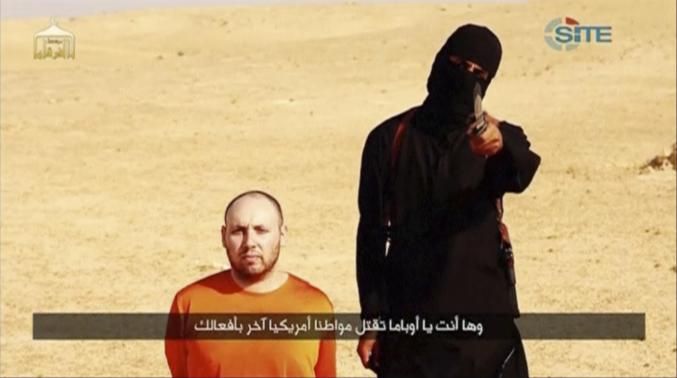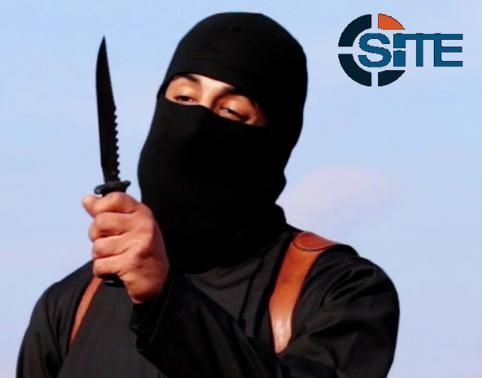 A masked, black-clad militant, who has been identified by the Washington Post newspaper as a Briton named Mohammed Emwazi, stands next to a man purported to be Steven Sotloff in this still image from video.The masked "Jihadi John" killer who fronted Islamic State beheading videos has been identified as Mohammed Emwazi, a British computer programming graduate from a well-to-do London family who was known to the security services.
A masked, black-clad militant, who has been identified by the Washington Post newspaper as a Briton named Mohammed Emwazi, stands next to a man purported to be Steven Sotloff in this still image from video.The masked "Jihadi John" killer who fronted Islamic State beheading videos has been identified as Mohammed Emwazi, a British computer programming graduate from a well-to-do London family who was known to the security services.
The black-clad militant brandishing a knife and speaking with an English accent was shown in videos released by Islamic State (IS) apparently decapitating hostages including Americans, Britons and Syrians, reuters reports.
The 26-year-old militant used the videos to threaten the West, admonish its Arab allies and taunt President Barack Obama and British Prime Minister David Cameron before petrified hostages cowering in orange jump suits.
Emwazi's name was first disclosed by the Washington Post. Two U.S. government sources who spoke on condition of anonymity confirmed to Reuters that investigators believed Jihadi John was Emwazi.
 A masked, black-clad militant, who has been identified by the Washington Post newspaper as a Briton named Mohammed Emwazi, brandishes a knife in this still image from a 2014 video obtained from SITEDressed entirely in black, a balaclava covering all but his eyes and the bridge of his nose and a holster under his left arm, Jihadi John became a menacing symbol of Islamic State brutality and one of the world's most wanted men.
A masked, black-clad militant, who has been identified by the Washington Post newspaper as a Briton named Mohammed Emwazi, brandishes a knife in this still image from a 2014 video obtained from SITEDressed entirely in black, a balaclava covering all but his eyes and the bridge of his nose and a holster under his left arm, Jihadi John became a menacing symbol of Islamic State brutality and one of the world's most wanted men.
Hostages called him John as he and other Britons in Islamic State had been nicknamed the Beatles.
He was unmasked publicly for the first time on Friday by British media which published a photograph showing Emwazi as a schoolboy.
Emwazi was born in Kuwait but came to Britain aged 6 and graduated with a computer programming degree from the University of Westminster before coming to the attention of Britain's main domestic intelligence service, MI5, according to an account given by Asim Qureshi, the research director of the Cage charity that campaigns for those detained on terrorism charges.
Emwazi, a fluent Arabic speaker, said MI5 had tried to recruit him and then prevented him from traveling abroad, forcing him to flee abroad without telling his family, Qureshi told a news conference in London.
Emwazi traveled to Syria around 2012, Qureshi said.
AGENCIES HUNTING JIHAD JOHN
"Jihadi John" rose to notoriety in August 2014 when a video appeared showing a masked man raging against the United States before apparently beheading U.S. citizen James Foley off camera.
Intelligence services in the United States and Britain used a variety of investigative techniques including voice and facial recognition as well as interviews with former hostages to identify the man, intelligence sources said.
In a meeting with reporters in London, Qureshi painted a picture of a kind and thoughtful young man who faced harassment from MI5, which apparently suspected he wanted to join the Somali Islamist militant group al Shabaab.
BRITISH SPIES
Qureshi said British spies had tried to recruit Emwazi as a source but declined to provide specifics.
"I feel like a prisoner, only not in a cage, in London..," Emwazi wrote in an email to Cage.
He felt like "a person imprisoned and controlled by security service men, (who) stopping me from living my new life in my birthplace and my country, Kuwait".
Cage said Emwazi was detained in Tanzania, where he went for a safari holiday with two friends in August 2009.
He was deported to Amsterdam and interrogated by MI5 and a Dutch intelligence officer and then sent back to Britain, according to Qureshi.
Reuters was unable to immediately verify the version of events given by the charity, which provoked criticism for shifting the responsibility for Emwazi's crimes.
"I think this is an attempt to deflect attention from Jihadi John," said Shiraz Maher, Senior Fellow at the International Centre for the Study of Radicalization, King's College London.
"They're trying to lay the blame for this at the feet of the British government," he told Sky news.
The Cage charity, which also worked with the family of Michael Adebolajo, the Muslim covert who with an accomplice killed a British soldier in London in May 2013, said both men had been victims of undue pressure from the security services.
Britain's MI5 security service was not immediately available for comment on those allegations.
After becoming frustrated following three failed attempts to return to Kuwait, and changing his name to Mohammed al-Ayan, Emwazi left his parents' home and slipped out of Britain, according to Qureshi.
Four months later, police visited the family home to say they had information he had entered Syria. His family thought he was in Turkey doing aid work.
"Jihadi John" fronted gruesome Islamic State videos that showed either the killing or bodies of victims including U.S. citizens James Foley, Steven Sotloff and Peter Kassig, Britons David Haines and Alan Henning, Japanese Kenji Goto and over 20 Syrian soldiers.
 В Атырау -10
В Атырау -10